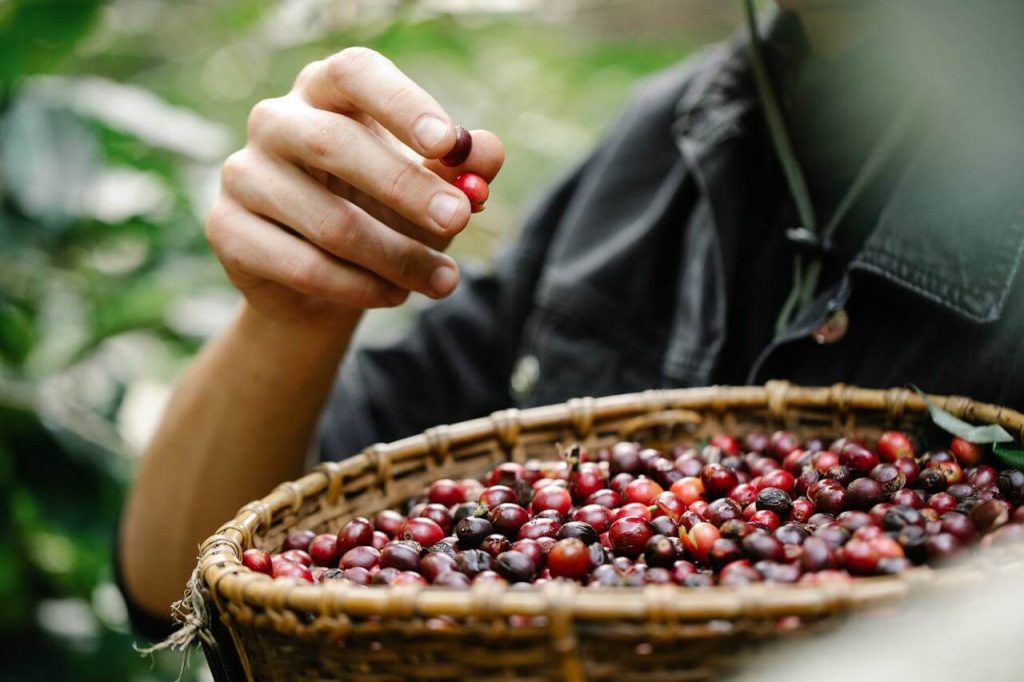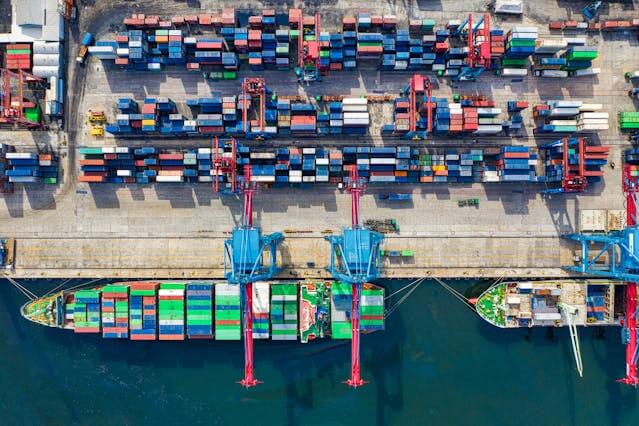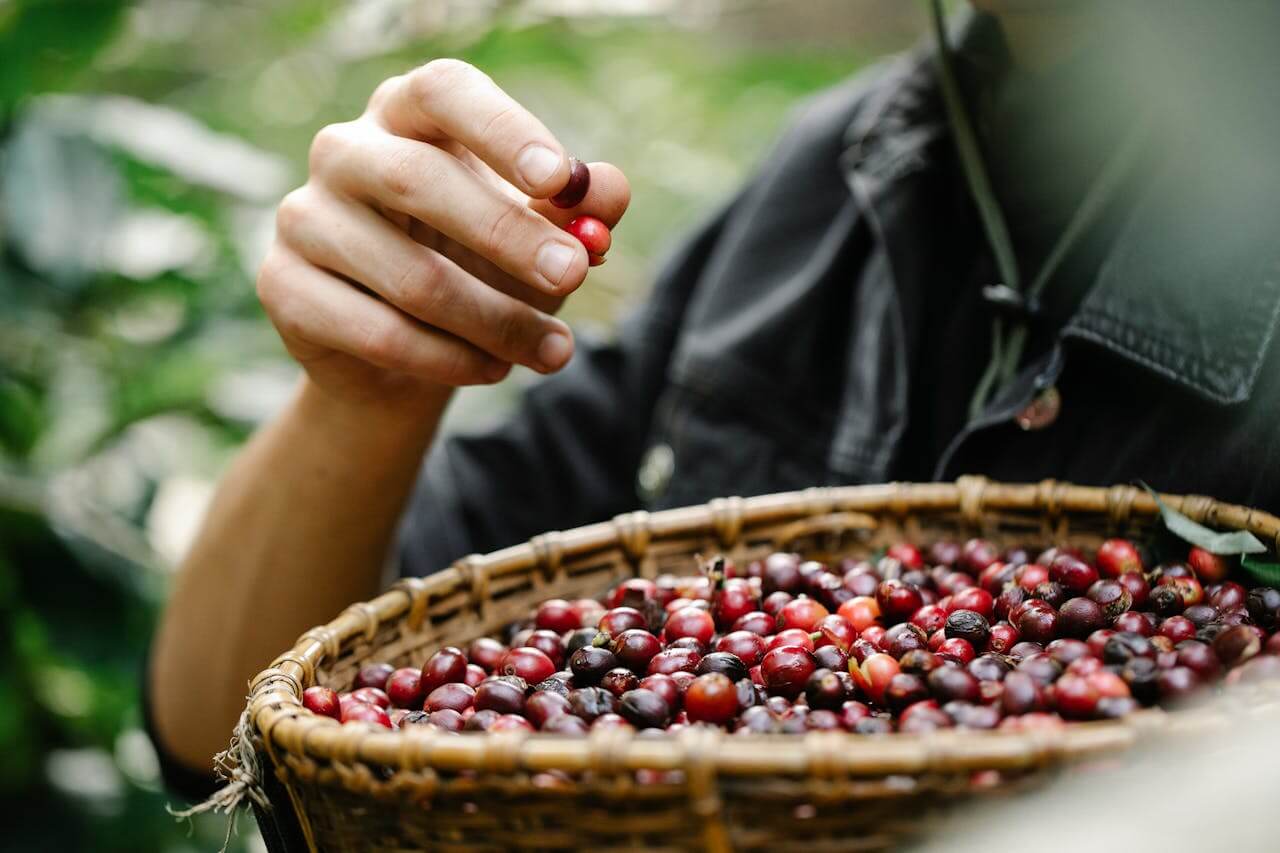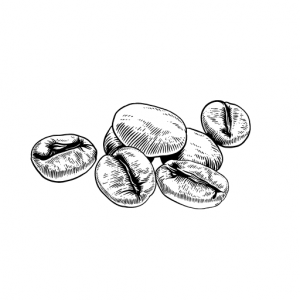Picture this: a beautiful morning, the aroma of freshly brewed coffee wafting through the air, and a warm cup of rich, flavorful coffee in your hands. The world of coffee is vast and diverse, offering a myriad of unique experiences that tantalize our senses and transport us to different cultures and landscapes. If you’re a coffee enthusiast like me, then let me take you on a journey to one of the most enchanting coffee destinations in the world – Indonesia.
Indonesian coffee holds a special place in the global coffee market for its exceptional quality and unique flavors. As one of the top coffee exporting countries in the world, Indonesia has become a sought-after source for coffee lovers and businesses around the globe. In this article, we will explore the thriving Indonesian coffee export industry, the process of exporting Indonesian coffee, the key players in the market, and the efforts made to promote Indonesian coffee worldwide.
Key Takeaways:
- Indonesia is renowned for its exceptional coffee quality and unique flavors.
- The Indonesian coffee export industry is a major player in the global coffee market.
- Indonesian coffee exporters work closely with coffee farmers to ensure the highest quality beans.
- The global market for Indonesian coffee includes both wholesale buyers and individual consumers.
- Efforts are being made to promote Indonesian coffee worldwide and showcase its cultural significance.
The Rise of Indonesian Coffee Production and Exports
Over the years, Indonesia has experienced tremendous growth in its coffee production and exports. Renowned for its diverse coffee varieties, including Arabica and Robusta beans, Indonesia cultivates its crops in regions with distinct soil and climate conditions. With its fertile volcanic soil and ideal growing conditions, Indonesia has emerged as one of the top coffee producers globally. Notably, Indonesian coffee exports have witnessed a steady increase in volume, solidifying its position as a crucial player in the global coffee market.
Indonesia’s coffee production industry has flourished due to the country’s favorable geographical conditions and dedicated coffee farmers. The industry caters to both domestic and international demands, supplying coffee beans that are renowned for their exceptional quality and unique flavors.
| Top Coffee Producing Countries | Production (in metric tons)* |
|---|---|
| Brazil | 2,591,000 |
| Vietnam | 1,702,000 |
| Colombia | 861,000 |
| Indonesia | 658,739 |
| Ethiopia | 463,058 |
*Data from 2020, Source: International Coffee Organization
Indonesian Coffee Production

The rich volcanic soil in Indonesia, coupled with the country’s favorable climate, provides optimal growing conditions for coffee plants. The coffee farms are located in diverse regions, including Sumatra, Java, Bali, Sulawesi, and Papua, each known for producing unique coffee profiles. The cultivation of Arabica and Robusta beans contributes to the wide range of flavors found in Indonesian coffee. Arabica is typically grown in higher altitudes, resulting in a milder and more nuanced taste profile, while Robusta thrives in lower elevations, yielding a stronger and more robust flavor.
Indonesia’s commitment to sustainable farming practices further enhances the quality of its coffee. Many farmers adopt eco-friendly methods, such as organic farming and shade-grown cultivation, preserving the natural environment and promoting biodiversity conservation.
The rise in Indonesian coffee production has not only met the domestic demand but has also fueled the country’s coffee exports, captivating the international market with its distinct flavors and high-quality beans.
Key Players in the Indonesian Coffee Export Industry

The Indonesian coffee export industry is comprised of several key players who play a crucial role in the growth and success of the sector. These players include small-scale coffee farmers, large coffee estates, coffee cooperatives, coffee traders, and exporters. Together, they work tirelessly to ensure that Indonesian coffee reaches the international market, showcasing the country’s rich coffee heritage and unique flavors.
Some of the notable Indonesian coffee exporters are:
| Company | Website |
|---|---|
| PT Kopi Mera | www.kopimera.com |
| PT Toarco Jaya | www.toarcojaya.com |
| PT David Roy Indonesia | www.davidroyindonesia.com |
These companies work closely with coffee farmers, sourcing the finest Indonesian coffee beans and adhering to strict quality standards. By collaborating with local farmers, they ensure that the coffee beans are grown and harvested with care, leading to the production of exceptional coffee that meets the demands of global coffee enthusiasts.
The Process of Exporting Indonesian Coffee
Exporting Indonesian coffee involves a meticulous process that ensures the highest quality beans reach international markets. Indonesian coffee exporters work closely with coffee farmers throughout the entire process, from cultivation to packaging and shipping. Let’s delve into the various stages of exporting Indonesian coffee:
Cultivation and Harvesting
Coffee farmers cultivate and nurture coffee plants in the fertile volcanic soil of Indonesia. They carefully select the best coffee varieties, such as Arabica and Robusta, and meticulously tend to the crops, closely monitoring factors like soil quality, irrigation, and shade.
When the coffee berries are ripe, skilled farmers handpick them with great care, ensuring only the finest, fully matured beans are harvested. This attention to detail in the cultivation and harvesting stages contributes to the exceptional quality of Indonesian coffee.
Processing and Sorting
After harvesting, the coffee beans undergo a series of processing steps to remove the fruit and pulp. This may involve either the wet or dry method, depending on the desired flavor profiles. The wet method involves removing the outer skin and pulp, while the dry method involves drying the entire cherry before removing the outer layers of skin and pulp.
Once processed, the coffee beans are carefully sorted based on their size, color, and quality. Skilled workers meticulously inspect the beans, ensuring only the best make it to the next stage. This sorting process helps maintain the high standards and consistent quality of Indonesian coffee.
Roasting and Packaging
Next, the sorted coffee beans undergo the crucial step of roasting, where they transform from green to the rich, aromatic beans cherished by coffee lovers worldwide. The roasting process, carefully controlled to achieve the desired flavor profile, brings out the unique characteristics of each Indonesian coffee variety.
After roasting, the coffee beans are expertly packaged, ensuring their freshness and preserving their flavors. The packages are designed to protect the coffee from external factors that could compromise its quality, such as moisture and air.
Shipping and Export
Once packaged, the Indonesian coffee is ready for export to various countries around the world, where coffee enthusiasts eagerly await the opportunity to savor its distinctive flavors. Coffee exporters collaborate with logistics partners to ensure that the beans are shipped safely and efficiently, maintaining their freshness throughout the journey.
Indonesian coffee exporters adhere to strict quality control measures during every step of the export process, guaranteeing that customers receive exceptional coffee that embodies the rich heritage and dedication of Indonesian coffee farmers.
Experience the journey of Indonesian coffee firsthand, from cultivation to export, as illustrated in the following table:
| Stage | Description |
|---|---|
| Cultivation and Harvesting | Skilled farmers cultivate coffee plants and handpick ripe coffee berries. |
| Processing and Sorting | Coffee beans are processed and sorted based on size, color, and quality. |
| Roasting and Packaging | Coffee beans are expertly roasted and packaged to preserve their unique flavors. |
| Shipping and Export | Coffee is shipped and exported to global markets, ensuring its freshness and quality. |
The Global Market for Indonesian Coffee
Indonesian coffee has captivated the taste buds of coffee enthusiasts worldwide, thanks to its exceptional flavors and uncompromising quality. This has contributed to the growing demand for Indonesian coffee in the global market. Coffee lovers who appreciate the rich and distinct taste of Indonesian coffee are the driving force behind its popularity. The global market for Indonesian coffee caters to both wholesale buyers and individual consumers who seek premium-quality coffee.
The unique characteristics of Indonesian coffee, such as its complex flavors, earthy undertones, and smooth finish, have earned it a dedicated fan base. Coffee connoisseurs in various countries place a premium on Indonesian coffee due to its unparalleled attributes. Among the key export markets for Indonesian coffee are the United States, Japan, Germany, Italy, and the Netherlands. These countries have developed a strong affinity for Indonesian coffee and are willing to pay a premium to experience its exceptional taste.
To provide a visual representation of the global market for Indonesian coffee, let’s take a look at the table below:
| Country | Import Volume (in metric tons) |
|---|---|
| United States | XX,XXX |
| Japan | XX,XXX |
| Germany | XX,XXX |
| Italy | XX,XXX |
| Netherlands | XX,XXX |
As shown in the table, the United States stands as one of the largest importers of Indonesian coffee, followed by Japan, Germany, Italy, and the Netherlands. These countries recognize and appreciate the unique characteristics that Indonesian coffee brings to the table, making them key players in the global coffee market.
In order to visually demonstrate the scope and relevance of the global market for Indonesian coffee, we have placed an image below that represents the international reach of Indonesian coffee exports:

Efforts to Promote Indonesian Coffee Worldwide
Indonesia’s rich coffee heritage and exceptional coffee quality deserve global recognition. To achieve this, the Indonesian government and coffee industry stakeholders have launched various efforts to promote Indonesian coffee worldwide. Through strategic initiatives and collaborations, they aim to increase awareness and establish Indonesian coffee as a preferred choice among coffee enthusiasts and businesses globally.
Prominent Initiatives
Indonesia actively participates in international coffee events and trade fairs, leveraging these platforms to showcase its diverse coffee offerings. By gaining exposure on a global scale, Indonesian coffee captivates the attention of industry professionals, buyers, and coffee lovers, creating opportunities to expand its reach and market presence.
Collaborations with international coffee associations play a vital role in promoting Indonesian coffee. These partnerships facilitate knowledge exchange, market research, and open new avenues for exporting Indonesian coffee to a broader network of international buyers. Working together, they strive to position Indonesian coffee as a symbol of excellence and craftsmanship.
Marketing Campaigns
Through targeted marketing campaigns, Indonesian coffee highlights its unique qualities, such as distinct flavor profiles, sustainable farming practices, and traditional brewing methods. These campaigns leverage digital platforms, social media, and traditional advertising channels to share the story of Indonesian coffee with the world, enticing coffee enthusiasts to explore and appreciate its diverse offerings.
In these marketing efforts, Indonesian coffee’s authentic and rich cultural heritage takes center stage. By showcasing the traditions, rituals, and unique experiences associated with Indonesian coffee, these campaigns evoke a sense of intrigue and curiosity among consumers, ultimately leading to increased demand and appreciation for Indonesian coffee products.
Results and Recognition
The ongoing efforts to promote Indonesian coffee have yielded positive results. More and more coffee enthusiasts and businesses are acknowledging the value and quality of Indonesian coffee. The market demand for Indonesian coffee has been steadily increasing, reflecting its growing popularity among discerning coffee drinkers worldwide.
| Key Initiatives | Impact |
|---|---|
| Participation in international coffee events and trade fairs | Increased exposure and market presence |
| Collaboration with international coffee associations | Expanded network of international buyers |
| Targeted marketing campaigns | Heightened awareness and demand for Indonesian coffee |
The concerted efforts to promote Indonesian coffee have successfully positioned it as a premium and sought-after coffee origin, earning recognition and respect from coffee enthusiasts and connoisseurs worldwide. Through these ongoing initiatives, Indonesian coffee continues to make its mark on the global coffee stage, inspiring a greater appreciation for the flavors and craftsmanship that define Indonesian coffee.
Benefits of Exporting Indonesian Coffee
Exporting Indonesian coffee offers numerous benefits, not only for coffee farmers but also for the national economy. Let’s explore the advantages of this thriving industry:
1. Income opportunities for coffee farmers
Exporting Indonesian coffee provides coffee farmers with valuable income opportunities. By participating in the global market, coffee farmers can improve their livelihoods and invest in their coffee farms. This allows them to enhance their cultivation techniques, employ skilled workers, and embrace sustainable farming practices.
2. Contribution to national economic growth
The export of Indonesian coffee plays a crucial role in the overall economic growth of the country. It generates foreign exchange earnings, which contributes to the national GDP and strengthens the economy. Additionally, the coffee export industry creates employment opportunities, benefiting individuals and communities involved in the coffee supply chain.
3. Promotion of unique coffee culture and heritage
By exporting Indonesian coffee, the country showcases its unique coffee culture and rich heritage to the rest of the world. Indonesian coffee is known for its distinct flavors and traditional brewing methods. The global recognition and appreciation of Indonesian coffee not only elevate the reputation of Indonesian coffee brands but also increase awareness and intrigue among coffee enthusiasts worldwide.
The image above represents the vibrant coffee culture and the journey of Indonesian coffee from farm to cup.
These benefits demonstrate the positive impact that exporting Indonesian coffee has on both individuals and the country as a whole. It not only boosts the income of coffee farmers but also contributes to economic growth and promotes the rich coffee culture and heritage of Indonesia.
Challenges and Opportunities in the Indonesian Coffee Export Industry
The Indonesian coffee export industry is a thriving sector with immense potential. However, it also faces several challenges that require careful attention and strategic planning to ensure continued success. These challenges include:
- Fluctuating Global Coffee Prices: The coffee market is influenced by various factors that can cause price volatility. As a result, Indonesian coffee exporters need to adapt to changing market conditions and optimize their pricing strategies to remain competitive.
- Climate Change and its Impact on Coffee Production: The effects of climate change, such as erratic rainfall patterns and rising temperatures, can significantly impact coffee production. Indonesian coffee exporters must implement sustainable farming practices and invest in climate-resilient coffee varieties to mitigate these challenges.
- Logistical Constraints: Indonesia’s vast archipelago poses logistical challenges for the coffee export industry. The transportation of coffee beans from remote areas to ports can be time-consuming and costly. Streamlining logistics and improving infrastructure will enhance efficiency in the export process.
- Competition from Other Coffee Producing Countries: The global coffee market is highly competitive, with many countries vying for market share. Indonesian coffee exporters need to differentiate their products and highlight the unique qualities of Indonesian coffee to stand out in the global arena.
However, these challenges also present opportunities for innovation, sustainability, and market diversification. By leveraging these opportunities, the Indonesian coffee export industry can overcome challenges and continue to flourish. Some of the opportunities include:
- Innovation: Indonesian coffee exporters can explore new coffee varieties, processing methods, and packaging techniques to cater to evolving consumer preferences. Embracing innovation will help Indonesian coffee gain a competitive edge in the global market.
- Sustainability: The demand for sustainable and ethically sourced coffee is growing worldwide. Indonesian coffee exporters can capitalize on this trend by promoting their commitment to sustainable farming practices, biodiversity conservation, and fair trade.
- Market Diversification: While traditional markets such as the United States and Japan remain important, exploring new markets can provide a pathway for growth. Indonesian coffee exporters can target emerging coffee markets in Asia, Europe, and other regions to expand their customer base.
By addressing the challenges and capitalizing on the opportunities, the Indonesian coffee export industry can navigate the competitive landscape, enhance its global presence, and maintain its position as a leading player in the international coffee market.

Future Outlook for Exporting Indonesian Coffee
The future of exporting Indonesian coffee looks promising as the global demand for specialty and premium coffees continues to grow. Indonesian coffee has gained recognition for its rich coffee heritage, unique flavors, and commitment to sustainable farming practices. This positions Indonesia as a potential leader in the global coffee market.
To capitalize on this opportunity, Indonesian coffee exporters need to focus on maintaining the quality and distinctiveness of their coffee beans. By investing in innovative farming techniques, such as precision agriculture and sustainable irrigation practices, Indonesian coffee farmers can enhance the flavor profiles and yield of their coffee crops.
Diversifying Markets and Strengthening Partnerships
In addition, Indonesian coffee exporters should explore new markets and strengthen their partnerships with coffee importers and distributors around the world. By understanding the preferences and trends of different coffee markets, exporters can tailor their offerings to meet the demands of specific regions.
Furthermore, building strong relationships with international coffee associations and industry influencers can help Indonesian coffee gain visibility and credibility in the global market. Collaborating on marketing campaigns and participating in international coffee trade shows can generate awareness and attract new customers.
Investing in Research and Development
Investment in research and development is crucial for the future success of the Indonesian coffee export industry. By continuously improving coffee processing techniques, exploring new coffee varieties, and experimenting with innovative brewing methods, Indonesian coffee exporters can create unique and exceptional coffee experiences for consumers.
Research and development efforts can also help identify and address challenges faced by the industry, such as climate change and disease prevention. By finding sustainable solutions and implementing best practices, Indonesian coffee farmers can mitigate risks and ensure the long-term viability of their coffee production.
With the right strategies and initiatives in place, exporting Indonesian coffee has a bright future ahead. By prioritizing quality, innovation, and international collaborations, Indonesian coffee exporters can position themselves as trusted suppliers of premium Indonesian coffee and further strengthen Indonesia’s reputation as a global coffee powerhouse.
The Cultural Significance of Indonesian Coffee
Indonesian coffee holds a special place in the country’s cultural heritage. Coffee plays a significant role in social gatherings, ceremonies, and daily life in Indonesia. The aroma of freshly brewed Indonesian coffee wafts through the air, creating a warm and inviting atmosphere. It brings people together, fostering connections and conversations.
One of the unique aspects of Indonesian coffee culture is the traditional brewing method known as “kopi tubruk.” This method involves combining coarsely ground coffee beans and hot water directly in a cup, allowing the coffee grounds to settle at the bottom. It is a simple yet effective way to brew a strong and flavorful cup of coffee.
Another notable aspect of Indonesian coffee culture is the appreciation of “kopi luwak,” also known as civet coffee. Kopi luwak is made from coffee beans that have been eaten, digested, and excreted by the Asian palm civet. The unique fermentation process that occurs during digestion is said to enhance the flavor of the coffee beans. While the production of kopi luwak has faced controversy due to unethical practices, the appreciation for this unique coffee remains.
By promoting Indonesian coffee, the country not only showcases its thriving coffee industry but also shares its rich cultural traditions with the rest of the world. Indonesian coffee represents more than just a beverage—it reflects the hospitality, warmth, and diversity of Indonesian culture.
Sustainable Practices in Indonesian Coffee Farming
Sustainability is a cornerstone of the Indonesian coffee industry, with a strong focus on promoting eco-friendly farming practices and preserving the natural environment for future generations. Indonesian coffee farmers are at the forefront of adopting sustainable methods, aiming to reduce their carbon footprint and increase the overall sustainability of the industry.
One of the key sustainable practices embraced by Indonesian coffee farmers is organic farming. By eschewing synthetic pesticides and fertilizers, they preserve the integrity of the land and protect the health of the ecosystem. Organic farming not only ensures the production of coffee free from harmful chemicals but also promotes biodiversity conservation, allowing native flora and fauna to thrive alongside coffee crops.
Beyond organic farming, coffee growers in Indonesia have implemented various initiatives to minimize waste and promote resource efficiency. This includes the use of renewable energy sources, such as solar panels, to power coffee processing machinery and reduce reliance on fossil fuels. Additionally, practices like composting coffee pulp and recycling water help minimize environmental impact and conserve valuable resources.
Another important aspect of sustainable coffee farming in Indonesia is community engagement. Many farmers participate in programs that provide training and support in sustainable agricultural practices, empowering them to cultivate coffee in a way that promotes long-term environmental and economic stability. This collaboration between coffee farmers and local communities fosters a sense of ownership and shared responsibility for sustainable farming practices.
By prioritizing sustainability, Indonesian coffee farmers not only contribute to the preservation of the environment but also add value to their coffee products. As the demand for ethical and sustainable products continues to rise, environmentally conscious consumers actively seek out coffee that aligns with their values. Indonesian coffee, with its commitment to sustainable farming practices, resonates with these consumers and offers them a product that is not only delicious but also produced in an environmentally responsible manner.
Overall, sustainable practices in Indonesian coffee farming are crucial for the long-term viability and success of the industry. By promoting sustainability, Indonesian coffee growers uphold their commitment to environmental stewardship, support the preservation of natural resources, and meet the growing demand for ethically produced coffee. Through their efforts, they showcase the unique flavors of Indonesian coffee while ensuring a sustainable future for generations to come.
Conclusion
Exporting Indonesian coffee opens up a myriad of opportunities for coffee farmers, businesses, and coffee enthusiasts worldwide. The unique flavors and rich coffee culture of Indonesia set it apart in the global market. The country’s commitment to sustainability further enhances its appeal. By continuing to promote Indonesian coffee, investing in quality, and addressing industry challenges, Indonesia can solidify its position as a leading coffee exporter and showcase the best of Indonesian coffee to the world.


